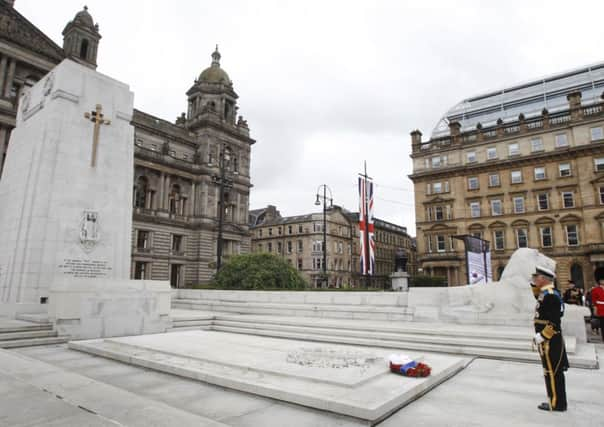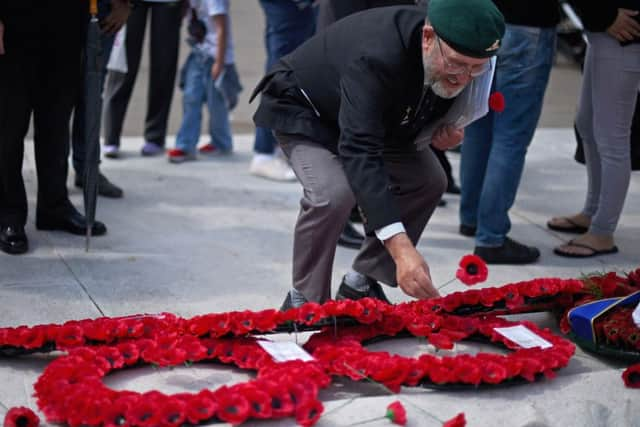Focus of remembrance for millions round the globe


The beginning of the First World War a century ago was marked across Britain yesterday, with the main service of commemoration at Glasgow Cathedral and a wreath-laying service at the cenotaph in George Square. While services were held in Belgium and in London, the focus of remembrance was Scotland, where representatives of the Commonwealth turned their attention from the glory of sport to the pity of war and attended a service of commemoration dedicated to the millions from across the British Empire who died in the Great War of 1914-1918.
The service at Glasgow Cathedral was led by Prince Charles and attended by Prime Minister David Cameron and Alex Salmond, the First Minister, as well as Commonwealth heads of government and other UK and Irish politicians.
Advertisement
Hide AdAdvertisement
Hide AdLast night, candles were due to be lit in homes and other buildings across Britain at 11pm, the hour on 4 August, 1914, when war was declared on Germany following their invasion of Belgium.


The Queen, currently at Balmoral for the summer, attended a service at nearby Crathie Kirk yesterday evening.
In Inverness, earlier in the day, a candle was lit in memory of the war dead at the Old High Church then carried in procession to St Andrew’s Cathedral and placed at the First World War memorial, where the light will burn, passed from candle to candle, for the next four years.
Prime Minister Cameron said: “A hundred years ago today, Britain entered the First World War and we are marking that centenary to honour those who served, to remember those who died, and to ensure that the lessons learnt live with us forever.
“It is right to remember the extraordinary sacrifice of a generation and we are all indebted to them because their most enduring legacy is our liberty.”
The First Minister said: “No home, no school, no community in Scotland was left untouched by the devastating impact of the Great War, which remains one of the most brutal conflicts the world has ever seen.
“Scotland’s losses were, per capita, among the highest of any combatant nation, and the war’s effects on our nation were profound and long-lasting.”
At Glasgow Cathedral, less than 12 hours after the joyous end of the 20th Commonwealth Games, representatives of the 71 Commonwealth nations, once part of the British Empire, gathered to remember the fallen.
Advertisement
Hide AdAdvertisement
Hide AdLeading the service was the Rev Dr Laurence Whitley, Minister of Glasgow Cathedral, who said: “We meet because, on a summer’s day like this one, 100 years ago, the world changed. Our nations and peoples found themselves in a war the like of which had never before been experienced, the memory of which still haunts us all.”
Sir Trevor McDonald then introduced a series of readings that reflected on the enormity of the conflict, which claimed the lives of almost 900,000 British soldiers and an estimated 100,000 Scots.
The passages included poetry of Canadian Isabel Ecclestone Mackay and an extract from the diary of Arthur Honeyball from 22 October, 1914: “My platoon retired to a barn…and we placed the wounded behind a hay-stack… Captain Rose said that he would see where we could retire to next time, and as he looked round he was shot in the back.
“I asked him where he got it, he said in the back. As soon as he said that, he got another that killed him. I had got hold of him by the feet, and the other chap had got hold of his shoulders… and then I got mine through the thigh. I must have fainted, because when I came to my senses I was in a ditch and no one seemed near me.”
Sir Trevor then informed the congregation that, five days later, the family of Captain Rose, who was 34 years old, was informed by telegram of his death: “Lord Kitchener expresses his sympathy.”
The entrance of Britain and her empire into hostilities turned a European war into a global conflict and the contribution of the Commonwealth countries was noted.
Sir Trevor said: “During the years to come, we shall rightly hear more of the courage and suffering of our forces in the conflict but, especially as this city has known the privilege of welcoming our Commonwealth brothers and sisters to the Games just past, it is right that we pause now to remember their contribution.”
India contributed one million soldiers, of whom 54,000 were killed, while 60,000 troops fought for allied forces from the African continent. Over 7,000 were killed while 166 received decorations for bravery.
Advertisement
Hide AdAdvertisement
Hide AdFrom the southern hemisphere, Australia contributed 416,000 men, of whom 166,000 were wounded and 59,000 killed. New Zealand sent 100,000.
The Indian High Commissioner, Ranjan Mathai, then read from a letter from a soldier called Punjabi Rajpuyt: “Do not think this is war. This is not war. It is the ending of the world.”
Among the other readers were Kate Adie, the BBC war correspondent who reflected on the role of women in Britain who embraced work in munition factories; Mr Cameron, who read a passage from St Mark’s Gospel, and Kirsten Fell, 16, a pupil from Dunbar Grammar School who last May visited Flanders battlefields during a school trip.
After the service, the dignitaries layed wreaths at the cenotaph, while across Scotland commemorations were taking place.
Edinburgh will mark the anniversary on Sunday with a drumhead service at the Castle which will replicate front line services from 100 years ago.
SEE ALSO: